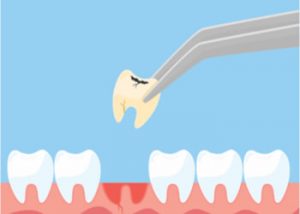If you are experiencing pain in your jaw, one of your wisdom teeth is likely impacted. This can be a very painful experience, and in some cases, it may become necessary to have the tooth extracted. This blog post will discuss the reasons for emergency wisdom tooth extraction and the involved procedure.
Wisdom tooth removal is an emergency procedure
Wisdom tooth removal is an emergency procedure typically performed in a hospital setting. The reasons for this are two-fold: first, because wisdom teeth are located in the back of the mouth, they can be challenging to access and extract, and second, because wisdom teeth are often impacted, they can be more challenging to remove than other types of teeth.
Impacted wisdom teeth can cause several problems, including pain, infection, and damage to adjacent teeth. In some cases, impacted wisdom teeth can also lead to cysts or tumors. If left untreated, these conditions can cause severe problems and require surgery.
For these reasons, it is essential to seek medical attention if you are experiencing any pain or discomfort in your jaw.
What is considered an emergency wisdom tooth extraction?
There are a few reasons your dentist may recommend an emergency wisdom tooth extraction:
- If you are experiencing pain or discomfort, this is a clear sign that something is wrong and that intervention is necessary.
- If you have an infection in the area around your wisdom tooth, this can spread quickly and become very dangerous.
- If your wisdom tooth is impacting another tooth, it can cause damage to that tooth over time.
If any of these conditions are present, it is essential to seek medical attention as soon as possible.
The procedure for emergency wisdom tooth extraction is relatively straightforward. First, your dentist will numb the area around your wisdom tooth with local anesthesia.
Five reasons for emergency tooth extraction
There are a few reasons you may need to have emergency tooth extractions:
-
- If you are experiencing pain or discomfort, this is a clear sign that something is wrong and that intervention is necessary.
- If you have an infection due to tooth decay or periodontal disease in the area around your tooth, this can spread quickly and become very dangerous.
- If your tooth is impacting another tooth, it can cause damage to that healthy tooth structure over time.
- If you have a cyst or tumor around your wisdom tooth, this can be painful and may require treatment.
- If you have a cracked tooth, you may have to get it removed. Your teeth absorb a lot of the impact from chewing, and if they don’t fit perfectly when biting down, chewing force may cause your molars to crack.
- If you have crowded teeth or your wisdom tooth is causing crowding in your mouth, it may be necessary to have it removed.
Should I go to the ER for wisdom tooth pain?
If you are experiencing pain in your jaw, it is essential to seek medical attention as soon as possible. Your dentist will likely recommend that you go to the hospital for an emergency wisdom tooth extraction. This is because wisdom teeth are located in the back of the mouth and can be difficult to access and extract. Additionally, wisdom teeth are often impacted, making them more challenging to remove than other types of teeth. If you are experiencing any pain or discomfort in your jaw, it is essential to seek medical attention as soon as possible.
What should I expect after an emergency wisdom tooth extraction?
After your procedure, you can expect some swelling and bruising around the extraction site. You may also experience some pain and discomfort. These symptoms are typical and will typically resolve within a few days. However, if you share any severe pain, swelling, or bleeding, it is necessary to seek medical attention as soon as possible.
Emergency wisdom tooth extraction is a procedure that is typically performed in a hospital setting. The reasons for this are two-fold: first, because wisdom teeth are located in the back of the mouth, they can be challenging to access and extract, and second, because wisdom teeth are often impacted, they can be more challenging to remove than other types of teeth. If you are experiencing any pain or discomfort in your jaw, it is essential to seek medical attention as soon as possible.
What should I expect after an emergency wisdom tooth extraction?
After your procedure, you can expect some swelling and bruising around the extraction site. You may also experience some pain and discomfort. These symptoms are typical and will typically resolve within a few days. However, if you share any severe pain, swelling, or bleeding, it is essential to seek medical attention as soon as possible.
Emergency wisdom tooth removal is a standard procedure typically performed in a hospital setting. If you are experiencing any pain or discomfort in your jaw, it is essential to seek medical attention as soon as possible.
After your procedure, you can expect some swelling and bruising around the extraction site. You may also experience some pain and discomfort. These symptoms are typical and will typically resolve within a few days. However, if you experience any severe pain, swelling, or bleeding, it is essential to seek medical attention as soon as possible.
The extraction is relatively straightforward:
- Your dentist will numb the area around your wisdom tooth with local anesthesia.
- They will incise the gum tissue and remove the tooth.
- To control bleeding, they will close the incision with stitches and place a gauze pad over the extraction site.
After your procedure, you can expect some swelling and bruising around the extraction site.
Is wisdom teeth removal considered an emergency?
Wisdom teeth removal is considered an emergency if you are experiencing any pain or discomfort in your jaw. Additionally, if your wisdom tooth is causing crowding in your mouth, it may be necessary to have it removed.
Emergency wisdom tooth removal is a standard procedure typically performed in a hospital setting. If you are experiencing any pain or discomfort in your jaw or other teeth, it is essential to seek medical attention as soon as possible. After your procedure, you can expect some swelling and bruising around the extraction site. You may also experience some pain and discomfort. These symptoms are typical and will typically resolve within a few days. However, if you experience any severe pain, swelling, or bleeding, it is essential to seek medical attention as soon as possible.
References
https://www.mayoclinic.org/tests-procedures/wisdom-tooth-extraction/about/pac-20395268
https://www.webmd.com/oral-health/wisdom-teeth-adult
https://www.verywellhealth.com/how-are-wisdom-teeth-removed-1059378
